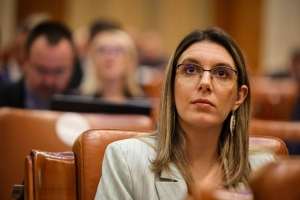• I said "The Lord's Prayer"
• I have warned that we didn't honor the Commandments
• I did not say that, had we abided by the Commandments, we would have avoided the crisis (because that is obvious)
• I did not draw any conclusions
Out of the blue, I found myself invited by Cătălin Ştefănescu to appear on "100% Guaranteed", on TVR1, an invitation which surprised me, because the show is in the area of culture and I thought folks like that cringe as soon as you mention finance (in my case, the opposite isn't true), and when he told me on the phone that he would like to have me talk about "the Culture of the crisis", I appreciated the fact that he was giving me an opportunity which I had been looking for a long time.
I have been trying for a long time, (but I couldn't find the opportunity), to make my opinion heard, namely that I don't think that the overlapping of the financial crisis and of the cultural crisis and (less obvious) of the crisis of Christianity are mere coincidence.
I gave a strong signal last year, in the issue published by BURSA on November 7th, titled "The Crossroads", which was dedicated to the reactions of the Vatican and of the Greek Orthodox Church to the developments of the world financial crisis - we published in full two documents:
A. "Towards the reform of the international monetary and financial system in a manner which answers the needs of all the people" a study which was published by the Pontifical Council for Justice and Peace, on October 24th, 2011, a large text, specializing in finance, social and political problems, in which the Vatican considers that the solution to the world financial crisis consists of the creation of a world government, on the principle of "subsidiarity" (of the aid granted, whenever the world authority considers there is a need for it);
B. "The Encyclical of the Holy Synods of the Church of Greece", published on January 2011, which, even though it was made public ahead the study of the Vatican, seems to vehemently argue against it ("Please remember that to many specialists in economics, the current crisis is manufactured, it is a crisis which pursues to control the world, by powers which have no love for people") and found consumerism ("the spiritual crisis") as the root cause behind the world crisis ("The essence of the spiritual crisis is the absence of life meaning"), and proposes "asceticism" as a solution, which it defines not "as a deprivation from pleasure, but rather as enriching life with meaning".
Given my interest on the matter, the invitation to speak on the show of TVR1 was a perfect fit, because its audience is less specialized than that of BURSA, meaning that discussing the topic of the crisis from a religious angle wouldn't seem completely strange, and in fact, since it would be me appearing on the show, it gives me with the excuse to publish in the newspaper the opinions I expressed in my appearance on TV, with some additions
The show will be aired on TVR1 on April 29th.
• TEAM CULTURE 2012
In the beginning of March, Uffe Elbæk, the minister of Culture of Denmark, (the country which took over the presidency of the European Council for six months), launched a "taskforce" named "Team Culture 2012", comprising 13 people of culture from Europe (but, which, among directors, screenwriters and architects also comprises an ...alpinist), with the goal of drafting a manifest about the role of art and culture in times of crisis, a manifest which is set to be made public in June.
The initiative is praiseworthy, for two reasons: the first - culture is being given some attention, in the serious context of our financial, economic, political and social survival; the second - creativity and inventiveness are needed, in a new world, resulting from reorganization.
Unfortunately, the European authors of the initiative seem to be themselves lacking in confidence that they would be able to find an escape from the crisis through any cultural action, because, being victims to management confusions, they are limiting themselves to promoting the creation of jobs in the area of culture and innovative ingenuity, but aren't doing anything to promote spirituality.
And without it, there are no miracles.
A disappointing part of Cinderella which culture is saddled with...
• A LOST MEANING
For the TV show, I had prepared "The Lord's prayer" in Latin, so I can show, that, by translating it, we have lost one of the meanings of the prayer, which was undoubtedly present in the Aramaic original, and had been preserved in the Latin version:
"Pater noster, qui es in caelis sanctificetur nomen tuum;
Adveniat regnum tuum.
Fiat voluntas tua sicut in caelo et in terra
Panem nostrum qvotidianum da nobis hodie.
Et dimitte nobis debita nostra, sicut et nos dimittimus debitoribus nostris.
Et ne nos inducas in temptationem; sed libera nos a malo.
Amen."
I have emphasized the words "debita" (the debts) and "debitoribus" (debtors), to show how the so-popular wording we use in Romanian - "And forgive us for having wronged others, as we also forgive those who have wronged us" - initially had a different meaning: "And forgive our debts, just like we forgive our debtors". (Matthew, 6)
In Latin, the word used for "mistake" is "errorem", "sin" is "peccatum" and "guilt" is called "culpa" (but under no circumstances, "debitum" which is the word used for "debt").
In Aramaic - the language which Jesus uttered the prayer in -, the word "tov" also means "debt", "sin", "guilt" and "crime".
Just like in Aramaic, the Latin word of "debitum" also has a connection between the meaning of "debt" and that of "sin" (going through the notion of "moral obligation"), whereas, in Greek, there are two distinct words for "sin" and "debt", ("amartia" and "ofeilema" respectively), a separation which could explain the way the prayer was translated in Romanian, which chose the meaning of "mistake, sin".
In some of the Greek versions of the prayer, "The Lord's prayer" uses the word "ofeilema" (debt), whereas, in all its versions, Luke uses "amartia" (mistake, sin).
It needs to be mentioned that the Gospel of Matthew was initially written in Aramaic.
If the only argument in favor of the notion of "material debt" would be resorting to the original version, then the claim that Jesus actually spoke about the forgiveness of debts (including monetary ones), and not just about forgiving trespasses, would have a very shaky foundation.
But 15 verses earlier, the Gospel according to Matthew, had recorded the teachings of Jesus on borrowing and lending: "Give to the one who asks you, and do not turn away from the one who wants to borrow from you." (Matthew, 5:42)
Therefore, the meaning of the "Lord's prayer" also includes the meanings of loans and monetary debt.
And what Jesus says, both "through the Lord's prayer", as well as on the loan, strongly reinforces the Commandments of the Old Testament.
• GOD'S COMMANDMENTS ASK THAT YOU FORGIVE THE DEBTS
In the following two verses, just after the "Lord's prayer", Jesus explains:
"14. For if you forgive others their trespasses, your heavenly Father will also forgive you;
15. but if you do not forgive others their trespasses, neither will your Father forgive your trespasses." (Matthew 6)
If we replace the Romanian word "trespasses" with the Latin word "debita", we will the meaning of Chapter 15 of the "Deuteronomy" in the Christian teachings:
"1. At the end of every seven years you shall grant a release.
2. And this is the manner of the release: every creditor shall release what he has lent to his neighbor. He shall not exact it of his neighbor, his brother, because the Lord's release has been proclaimed. "
The forgiveness of physical debts, every seven years, is expressed, in Judaism through the word "Shmita" and represents the core tenet of the three Books which deal with the economic life - "Exodus", "Leviticus" and "Deuteronomy".
I hereinafter include some of the commandments written in the same chapter of the "Deuteronomy", to prove that there is no mistake when we claim that these are the teaching of Jesus:
"7. If among you, one of your brothers should become poor, in any of your towns within your land that the Lord your God is giving you, you shall not harden your heart or shut your hand against your poor brother;
8. but you shall open your hand to him and lend him sufficient for his need, whatever it may be
9. Take care lest there be an unworthy thought in your heart and you say, "The seventh year, the year of release is near,' and your eye look grudgingly on your poor brother, and you give him nothing, and he cry to the Lord against you, and you be guilty of sin.
10. You shall give to him freely, and your heart shall not be grudging when you give to him, because for this the Lord your God will bless you in all your work and in all that you undertake." (Deut., 15),
• SHMITA
For a long time, historians were skeptical that the "Shmita" - the unconditional forgiveness of the material debts, once every seven years, in the Sabbatical Year was ever actually implemented, until irrefutable evidence was found that it was a practice which was truly used, with precedents in the Babylon, and even in the Sumer.
"Shmita" explicitly seeks to reduce the disparity between the rich and the poor, to harmonize the economic system and to keep the wealth spread about equally, so that society can continue to develop, and to do so in a consistent manner, without the deadlocks and the turmoil which crises bring about.
"Shmita" demands that on the seventh year, agricultural works not be performed, and that the owners not harvest the fruit which grow naturally, and instead allow anyone to who wishes to pick them do so (a set of Commandments also urges to save and prepare for survival during the Sabbatical year).
According to the Law, forgiving the debts is made in the name of God, as a condition for the entrusting of the Promised Land to the Jews to use - but without becoming its owners (a condition which stipulates that lands would not be allowed to become the object of sale contracts, a restriction which still causes disagreements in the Knesseth, to this day, in spite of the tricks which the ancient Rabbis devised to allow the sale of land).
As a result, the forgiveness of debts does not necessarily involve gratitude towards the creditor, for the forgiveness stems from the honor brought to God and to the seventh day, that of Creation.
The Bible also mentions the obligation, of releasing the slaves who lost their freedom on account of their inability to pay their debts and the restitution of all the seized collateral, including land, to their initial owners, during the Sabbatical year.
It even goes as far as commanding that the agricultural tools be returned to the initial owner, in every season of the agricultural labor.
The disappearance of this economic practice inherited from the Jews, marks the full reversal of the roles: whereas forgiving debts was a holy obligation, now the debt and its payment become holy and mandatory and represent the foundation of our economic and financial system.
Apparently, the last time the Shmita was used in Europe, was in Spain, by the Sephardi Jews, in the 13th century.
The fact that Jesus feel the need to mention the principles of the Shmita of the Deuteronomy at that time, means that those principles were no longer being honored in those days and that they needed to be reaffirmed and strengthened.
• THREE COMANDMENTS WHICH PROHIBIT INTEREST
Charging interest on loans is prohibited by three Orders, which eliminates any possibility for a different interpretation, dismantling each of the three parts of the loan transaction:
A. You must not lend him money at interest or sell him food at a profit. (Lev. 25:37);
B. You may charge a foreigner interest, but not a brother Israelite, so that the LORD your God may bless you in everything you put your hand to in the land you are entering to possess. (Deut. 23:20);
C. You are not allowed to participate in a deal of lending with interest, not as a guarantor, nor as a witness, nor as a notary (Ex. 22:24).
Obviously, these commandments were completely ignored by the financial civilization which we are living in.
In the Encyclical mentioned in the beginning, the holy Synod of the Church of Greece said the following: "We are a country under occupation and we fully execute the orders of our creditors".
They showed admirable courage in saying so.
However, why does the Encyclical not mention the sin of breaking the Commandments, explicitly, as specifically mentioned in the Bible?
• SINS
Have you ever seen a lunatic in the street yelling "You are all sinners!" ?
All that has been written so far validates his statement.
From a Christian and Judaic point of view, Greece has sinned, by borrowing money at interest.
But the fact that it entered default, has endangered the banks which lent money to it at interest and the other European states which those banks operated in (the forgiveness of Greece's sovereign debt, to the tune of 60%, recently accepted by its creditors, is not a "Shmita", for it was not done in the name of God, but rather by force of circumstances, in order to perpetuate the system).
Of course, the banks and the other European countries have also sinned by lending (and borrowing money) at interest.
Their weakness has led the Eurozone to the brink of disbandment and the European Union itself.
Of course, the European Union, through its European Central Bank, has sinned by endorsing the lending at interest agreements, and it charges interest itself on the money it lends.
From the Bible's point of view, Europe is a sinful continent, both in whole and in part, and in this regard, it is no different from the United States of America, as both violate the fourth Commandment concerning debts:
Never ask a poor man to pay his debt, if you know they cannot pay, nor pressure them (Ex. 22:24).
• THE CRISIS OF THE CHRISTIAN FINANCIAL SYSTEM
Coincidentally, Europe and the United States have the highest concentration of Christians in the world - 37% out of the total of 2.2 billion Christians on the planet.
In other words, this financial crisis, which affects the entire planet, is a crisis of the Christian finance, originating from the largest Christian areas in the world, with an epicenter in Greece, the country which invented the word "chaos" (which the ancient Greeks believed was an abyss in the Peloponnesus), a language which disseminated the word "crisis", in every European language, the language which the Old Testament (the Torah) was translated in, during the Ptolemaic rulers, the language which the New Testament was written in.
These may be mere coincidences, but I do not believe that in the absence of spirit, the miracle of overcoming the crisis can appear, while at the same time respecting humanity.
I do agree: asceticism is a solution.
It's just that this needs to be analyzed into more detail, so it can distance itself enough from the horrible excesses of fundamentalists, such as the ones of Savonarola (a Dominican who was declared a heretic by Pope Alexander the 6th "Borgia", whom he had focused his furious criticism on, which led to the excommunication of the former in 1497, followed by his arrest in 1498, his trial by a court of the Inquisition, after which he was sentenced to death, hanged, his body was burned on a pyre in the Piazza de la Signoria, and his ashes were scattered over the Arno river; the so-called "democratic" regime of Savonarola, in Florence - which in effect was a theocracy -, abolished usury among other things).
• ONE OF THE CONCLUSIONS
Jesus' recourse to the law leads deeper revolution than the mere replacement of a system with another, it does more than just mark the passage from slavery to feudalism, to capitalism, and perhaps, back again.
Jesus demanded that man be granted a different status - that of spiritual being - and implicitly tried to make the system submit to people.
From a contemporary perspective, Christianity would require that the status of man as a spiritual being be provided in the Constitution, as its supreme principle.
All the other provisions would be subordinated to it, making it stronger.
From that moment on, society's political organization would adapt to local conditions, regardless of whether this would result in communism, capitalism or anything else, as long as it does not alter the status of people.
Besides, in this particular case, I do not think that we have that many alternatives left.
Just subtleties.
Regardless of the means which will be used to overcome this world financial crisis, it still has the benefit of having brought these issues to the forefront again.
An inside joke, dreamed up by someone on the team of Herman Van Rompuy, the president of the European Council, became known to the public on March 29th: on April Fool's day, (April 1st), the European Council had scheduled a reunion, intended to help solve the crisis, which the Pope was set to attend as well, in order to give him the opportunity to pray for the saving of the European Union.
The joke may be spontaneous, but it might be just as well, a response to ideas like the ones in this article, which have probably been formulated in the many debates concerning the crisis.
The sarcasm of this joke is all the more deeper, since the Vatican had already came out with a statement supporting a purely political solution, of centralized global government, through the document of October 24th, 2011, which was published by BURSA.
In reality, two weeks after the document was published, Pope Benedict the 16th received Herman Van Rompuy, the president of the European Council, who had come in a visit to the Vatican (November 12th, 2011), to talk about the support of the Catholic Church for the European Union, which means that they had lots of opportunities to pray together.
•
Some historians claim that 2015 is the next year of the Schmita, calculated according to the Jewish calendar.
•
It needs to be noted that today, in the world, aside from capitalism, there are communities which run based on slavery, feudalism and communism. There are even systems similar to the primitive communal system and the tribute-based system (this enumeration is Marxist in nature).
Capitalism is merely dominant, but not universal, nor is it consistent across the world.
•
The explanation of the European crisis: we have an Italian as president of the European Central Bank and a German as a Pope.
•
"Occupy Wall Street", a citizen protest movement which was initiated on September 17th, 2011, in New York, followed by similar manifestations in 1,500 cities around the world, mobilized against the financial-banking system, which it considers the main generator of social and economic inequality; the movement stems from the protests of British students of 2010, the ones against austerity in Greece and Spain, ("indignados") and the "Arab Spring".
•
A study of the "World Institute for Development Economics Research" says that the wealth owned by the three richest people in the world is greater than that owned by the 48 poorest nations in the world.
This proves that there is enough wealth to satisfy everyone's needs.
According to a study from September 2011, of Branko Milanovic, chief-economist of the World Bank, the disparity between the rich and the poor is judged in two ways:
A. some claim that the global inequality is irrelevant, because of two reasons:
1) calculating global inequality would lead to a "crazy", meaningless result, because there is no Global government and no global civil society, and because of that, no political significance can be given to it, unlike in the case of the inequality existing within a certain country;
2) the poor would be more interested in improving their own material wealth, than in comparing it with that of those who are richer than them, meaning that even if the gap between the average American and the average African were to increase, the African would be very happy if the absolute amount of its earnings increased (Milanovic mentions here that studies which contradict this thesis).
B. other people claim that the global inequality is important, and have other arguments to support that theory:
1) From an ethical perspective, the fair distribution of wealth, within a nation, as well as between countries, is necessary, because the fate of every individual affects all of us;
2) from a political perspective, inequality fuels tension.
Branko Milanovic claims that in 1850, what mattered was the social category one was born in, because poverty was relatively equal from one country to the next (the author hereby notes that this was the basic foundation for Marxism), but now, after 150 years, what matters is the country you were born in, because like the economist claims, the income of a poor American, for instance, is five times higher than the highest income of an Indian, (without obviously taking into account the Indians who have a living standard similar to that of Westerners).
Simon Smith Kuznets, who won the Nobel Prize for Economics in 1971, (a Russian living in the US), claims that the inequality in the distribution of wealth favors growth in the poor countries, whereas in rich countries it reduces inequality (the development of poor countries involves switching from agriculture - which brings constant but capped wealth -, to industry - which leads to the acceleration in the speed of at which income grows -, whereas, in the industrialized countries, the need to make the access to education more democratic, caused by the need to create the workforce used in the industry, leads to the smoothing out of the income inequality).
While some consider that income inequality serves as an incentive for people, others consider that the elimination of inequity makes society more cohesive, with effects on health, demographics and political freedom.

























































